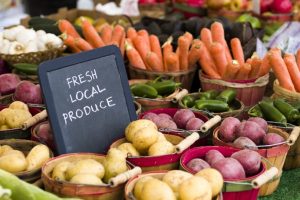
March 8, 2023, by sustainablenottingham
Understanding consumer behaviour towards sustainable foods
March 8th is International Women’s Day (IWD), so we’re taking the opportunity to highlight the work of UoN women leading the way to a more sustainable future. IWD is a global day celebrating the social, economic, cultural and political achievements of women.
Hannah Ford is a PhD student in Sensory and Consumer Science in the school of Biosciences. Hannah’s research is exploring consumer behaviour towards sustainable foods. Here, Hannah explains some of her results, discussing sustainable diets and meat reduction, specifically reviewing perceptions, barriers, motivations and future sustainable foods.
Understanding how to feed the world in a more sustainable way is arguably one of the biggest global challenges. With the looming threats of climate change, population growth and food security, consumers are encouraged to adopt plant-based diets for both personal and planetary health. Currently the landscape for sustainable food continues to change with new products and technologies emerging. It’s therefore important to understand consumer opinions and attitudes to achieve a sustainable food future.
What is a sustainable diet?

The Food and Agriculture Organization (FAO) states: ‘Sustainable diets are those with low environmental impacts which contribute to food and nutrition security and to healthy life for present and future generations. Sustainable diets are protective and respectful of biodiversity and ecosystems, culturally acceptable, accessible, economically fair and affordable; nutritionally adequate, safe and healthy; while optimizing natural and human resources.’
It’s a comprehensive definition, broadly covering three ‘pillars’: social, economic and environmental factors. It becomes more complex as the environmental aspect of sustainability can relate to specific themes such as Green House Gas (GHG) emissions, biodiversity, land and water use.
Consumer perceptions towards sustainable diets
Part of my research included a series of focus groups with young UK consumers. Results found there is confusion around making sustainable food choices, ‘is oat milk better than almond milk?’, and mixed perceptions around the environmental impact of food, ‘is local meat better than shipping an avocado across the world?’.
Sustainable food was mostly defined as home grown and local produce. Yet, with the UK importing 46% of its food, eating British food can be a challenge. Also, ‘localness’ doesn’t always imply a lower carbon footprint and instead the focus should be on the food type itself.
Sustainable diets and meat reduction
Food contributes to around a third of global GHG emissions, of which meat production contributes to half. Increasing evidence highlights the benefits of meat reduction, with the EAT Lancet commission report being the first to provide global dietary guidelines.
The topic of meat reduction can be very divisive. Meat is often the central part of a meal, it brings people together and holds cultural and religious significance. There are ways to consume ‘less but better’ and ‘cleaner’ meat through organic farming and regenerative agriculture. But, more affluent areas continue to over-consume meat, despite growing awareness around its negative environmental impact. In the UK, research analysing trends in meat consumption found reductions to be modest. This shows more is needed to accelerate change and reach meat-consumption targets that align with sustainable diets.
affluent areas continue to over-consume meat, despite growing awareness around its negative environmental impact. In the UK, research analysing trends in meat consumption found reductions to be modest. This shows more is needed to accelerate change and reach meat-consumption targets that align with sustainable diets.
Meat-eating behaviour is complex, determined by socio-demographic and external factors, alongside socio-cultural differences. To understand what influences meat-eating behaviour, I conducted an online survey in three countries with differing meat consumption patterns: Australia, China and the UK (n=1,777). It showed;
- Australia is significantly less willing to reduce meat compared to China and the UK.
- There were age and gender differences. e.g. Chinese males were more willing to reduce meat, whilst there was the opposite trend in the UK.
This highlights the importance of considering cultural and demographic differences when designing country specific meat reduction strategies.
Barriers and motivations
For consumers, barriers and motivations towards sustainable food relate several factors which vary from person to person. These include but are not limited to;
- the physical environment (i.e. the accessibility, convenience and cost of sustainable foods),
- social influences and trends (i.e. others consuming meat-free meals, popularity of sustainable foods),
- physical capability (i.e. ability to cook meat-free meals),
- psychological capability (i.e. personal awareness and knowledge of sustainable foods).
For many non-meat eaters, the motives to go meat-free are often driven by ethical and animal welfare issues. However, meat-eaters have different motives. Whilst this has been predominantly due to health benefits and price, more recent studies are finding the environment to be a driving factor. To support this, results from the online survey found the environmental benefits to be the most important in Australia and the UK. Yet in China, food safety was significantly more important.
Future sustainable foods
The development of plant-based products that deliver ‘meatier textures’ and flavours shows how far the plant-based market has grown. However, they can often be perceived as overly processed and nutritionally inadequate.
Future solutions to help reduce the consumption of animal products includes:

- the use of novel ingredients (e.g., edible insects, algae)
- novel technologies to produce cultured meat (also known as lab-grown meat),
- precision ferment dairy (e.g., using yeast cells to make ‘animal-free’ dairy).
Scepticism surrounding the environmental benefits of these technologies is likely to be a key barrier, alongside sensory appeal, affordability and food safety. Information and transparency are therefore paramount for consumer trust and acceptance.
Several factors determine how sustainable food will be in the future, many of which are outside of consumer control. Companies are responding to the demand for sustainable food but need to consider a balance between nutrition and environmental gain. For consumers, the success of any new product is largely dependent on food choices, so never underestimate the power of the individual.
To find out more on the topics of sustainable foods visit the links below:
- British Dietetic Associations (BDA) – Sustainable diets
- FAO – Sustainable Healthy Diets
- Table Debates
- Our World in Data – Environmental Impacts of Food Production
To find out more about Hannah’s research you can contact her via email or LinkedIn.
No comments yet, fill out a comment to be the first

Leave a Reply